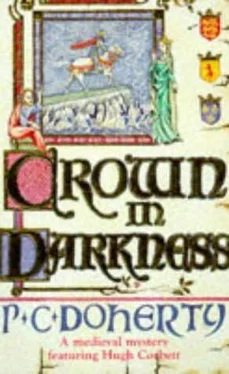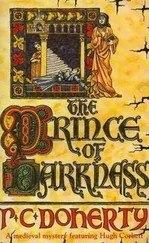Paul Doherty - Crown in Darkness
Здесь есть возможность читать онлайн «Paul Doherty - Crown in Darkness» весь текст электронной книги совершенно бесплатно (целиком полную версию без сокращений). В некоторых случаях можно слушать аудио, скачать через торрент в формате fb2 и присутствует краткое содержание. Жанр: Исторический детектив, на английском языке. Описание произведения, (предисловие) а так же отзывы посетителей доступны на портале библиотеки ЛибКат.
- Название:Crown in Darkness
- Автор:
- Жанр:
- Год:неизвестен
- ISBN:нет данных
- Рейтинг книги:4 / 5. Голосов: 1
-
Избранное:Добавить в избранное
- Отзывы:
-
Ваша оценка:
- 80
- 1
- 2
- 3
- 4
- 5
Crown in Darkness: краткое содержание, описание и аннотация
Предлагаем к чтению аннотацию, описание, краткое содержание или предисловие (зависит от того, что написал сам автор книги «Crown in Darkness»). Если вы не нашли необходимую информацию о книге — напишите в комментариях, мы постараемся отыскать её.
Crown in Darkness — читать онлайн бесплатно полную книгу (весь текст) целиком
Ниже представлен текст книги, разбитый по страницам. Система сохранения места последней прочитанной страницы, позволяет с удобством читать онлайн бесплатно книгу «Crown in Darkness», без необходимости каждый раз заново искать на чём Вы остановились. Поставьте закладку, и сможете в любой момент перейти на страницу, на которой закончили чтение.
Интервал:
Закладка:
Eventually, he reached the top. The cliff path was narrow; on one side a lurching drop, on the other a low clump of thick thorn bushes. Corbett dismounted, hobbled his pony, and looked around: the cliff path was now shale-strewn and at its peak before falling abruptly downwards to what he could faintly detect as the royal, fortified manor of Kinghorn. A horse could easily slip and so send its rider hurtling down to where black rocks rose hungrily from sea-washed, silver-white sands. Corbett went on his knees, crouching like a dog as he approached the cliff edge. He ran his fingers along the ledge, feeling the stout weeds which grew along the rocky rim. They were hard, tough, clinging rancorously to life. Except one, half pulled out at its root, the thinning frayed strands of a rope still tied to it. Corbett scrambled back, rose and went to the thorn bushes; there had been someone in amongst them. He could see the crushed, bent branches where the person had squatted. Nevertheless, he knew that the same damage could have been done by any of the curious drawn to this spot by Alexander's death or by the rope, used when they finally raised Alexander's body from the rocks.
Satisfied, Corbett unhobbled his horse, mounted and carefully descended the steep cliff path to Kinghorn. The monks had called it a fortress, the ferryman a palace. The reality was a fortified manor-house, a stone tower with a two-storey stone building surrounded by wooden outbuildings and protected by a huge, long wall and a deep ditch. Corbett approached the main gate and was immediately warned off by the quarrel of a crossbow thudding into the ground before him. He stopped abruptly, dismounted and held his hands up, shouting that he came in peace to pay his respects and those of the Lord Chancellor of England to the royal widow, Queen Yolande. Corbett doubted if the guard even understood, let alone heard him. After a short while, a figure appeared on the parapet above the main gate and waved him across the narrow bridge spanning the moat. The main gate opened sufficiently wide to let him pass and once inside Corbett found the usual clamour and bustle of any castle bailey except for the unusual presence of so many well-armed soldiers all wearing the livery of a white lion rampant, the royal insignia of Scotland. A captain in half-armour, a steel bascinet on his head, inspected Corbett's warrants, removed his dagger and listened attentively while the clerk introduced himself. The captain nodded and marched off, brusquely beckoning Corbett to follow him across the dirt-strewn yard, kicking out at dogs and almost trampling the chickens which scrabbled hungrily for food. They passed open kitchens, stables and a forge with their blackened, perspiring servants, entered the main building and climbed steep stone stairs. At the top the guard captain tapped lightly on a steel-studded door. A soft voice called "Entrez!" and Corbett was shown into a small though luxurious chamber with velvet buckram drapes on the walls, soft herb-strewn rushes on the floor with small, scented braziers placed around the walls. In the centre of the room was a woman sitting regally in a beautiful carved wooden chair, studying a piece of parchment in her lap. A group of ladies sat a fair distance away beneath the room's one and only window, ostensibly embroidering a piece of tapestry stretched across a stand.
The captain went down on one knee and muttered an introduction in atrocious French. The woman in the chair looked up, stared at him and then Corbett. Queen Yolande was beautiful with a small oval face, her skin was a tawny gold, her nose small, the eyes large and darkened. Only her mouth, pert and rather pouting, marred the effect for she looked arrogant and rather spoilt. Her dress was black silk though Corbett noticed that it emphasised rather than hid her plump breasts and narrow waist, and the white fox-fur on the cuffs of her gown drew attention to her fine wrists and long, white, bejewelled fingers. She chattered to the captain in French, dismissed him and beckoned Corbett to a small stool in front of her. Corbett felt slightly ridiculous and heard subdued laughter from one of her ladies, a rather overblown red-head, likewise in black, who was in the centre of the group involved with the tapestry.
The laughter was silenced by an imperious glance from Queen Yolande before she turned to question Corbett in French. He courteously replied, tactfully lying about his arrival in Scotland and explaining that he came with the personal condolences of the Lord Chancellor of England. Queen Yolande heard him out though she appeared to be only half listening. Gently, Corbett turned the conversation to the death of her husband. 'It is a pity, my Lady,' Corbett commented politely, 'that His Grace should have attempted that journey on such a wild night!' He bowed graciously towards her. 'I realise you are still in mourning and the subject is most painful to you, but the thought did occur to me as I made the same journey today.' The royal widow simply shrugged her elegant shoulders. 'His Grace was always impetuous!' she almost snapped. 'He should not have travelled in such rough weather. I could scarcely believe the message he sent earlier that day saying he would come!' 'His Grace told you that he was coming that night?' Corbett tentatively asked. 'When did he send such a message?' 'What business is it of yours?' Yolande snapped back, staring hard at Corbett. 'A messenger delivered a letter later that day. I don't know who brought it! I only remember because I immediately burnt it in exasperation!' Corbett smiled understandingly and gently diverted the conversation to other matters. He had asked enough questions and was sufficiently startled by Yolande to conceal his feelings behind the mask of diplomacy. He felt uneasy. Yolande was a royal widow; in a sense, her husband's passion for her had caused his death; yet Yolande seemed to resent, even hate her dead husband. Was this the woman, Corbett wondered, who had drawn King Alexander III of Scotland to gamble his life for her? Corbett could not pinpoint or express his reasons for the conclusions he drew but he felt the unease, something insubstantial, like a perfume emanating from this spoilt beautiful woman.
Corbett allowed the now desultory conversation to continue before discreedy interrupting. 'Madam, my master and His Grace, King Edward, will be delighted with the news that you are "enceinte". A small consolation at this time of great sorrow…' Yolande almost smirked as she gently patted her stomach. 'I do not care for your King, Master Corbett, but, yes, I do care for a possible future King of Scotland!' Corbett heard a snort of laughter from the red-headed lady-in-waiting, but ignored it. Queen Yolande did not. She spun round, glared at the woman and turned back to extend her hand to Corbett as a sign that the audience was over. Corbett bent, kissed the Queen's cool white hand and withdrew, ignoring the brazen look of the lady-in-waiting who had brought his interview to such a sudden end.
THREE
Outside the chamber, Corbett found the captain of the guard waiting for him, a little more relaxed now he realised that Corbett was acceptable to the Queen-Dowager. 'Are you intent on leaving this evening?' he asked, his English accent thick and guttural. 'Why?' Corbett smiled at him. 'Do I have a choice?' The soldier shrugged. 'You may stay and catch the ferry at first light when it crosses but that is your decision.' 'Then thank you,' Corbett courteously replied, 'I will stay. But tell me,' he added. 'Who is the red-headed lady-in-waiting to the Queen? She seemed a brazen hussy!' Now the soldier smiled, a yellow-toothed grin cracking the severity of his face. 'You mean Agnes Lennox?' he jibed. 'You're right. A brazen hussy indeed. There is no love lost between her and the Queen. Why?' 'Nothing,' Corbett muttered. 'But, look. Were you on duty the night the King died?' 'Of course. Though I never stirred from here. News of his death was brought by a messenger.' 'The same messenger,' Corbett interjected, 'who brought you news that the King intended to travel to Kinghorn?' 'Whish, no, man,' the soldier replied. 'That was simply a letter delivered at the gate just before dusk. God knows who brought it. You had best ask the purveyor that question.' Corbett felt his heart quicken. 'The same purveyor who greeted the King when he landed from the ferry?' 'Oh, aye,' the soldier replied. 'Alexander, he has the same name as the late king. Why do you ask?' he narrowed his eyes and stared hard at Corbett. 'You ask a lot of questions, Master Clerk, from England!' Corbett smiled. 'I am sorry,' he apologised. 'But the English court were so shocked by the death of your king they could scarcely believe it. My masters expect me to be hunting for news.' The soldier relaxed and tapped Corbett patronisingly on the shoulder. 'Yes, I know. We are all under orders. I can scarcely believe the King is dead and think it just a rumour. But, come, I will introduce you to Alexander, he's told his story many times. I vow he'd love to tell it again.'
Читать дальшеИнтервал:
Закладка:
Похожие книги на «Crown in Darkness»
Представляем Вашему вниманию похожие книги на «Crown in Darkness» списком для выбора. Мы отобрали схожую по названию и смыслу литературу в надежде предоставить читателям больше вариантов отыскать новые, интересные, ещё непрочитанные произведения.
Обсуждение, отзывы о книге «Crown in Darkness» и просто собственные мнения читателей. Оставьте ваши комментарии, напишите, что Вы думаете о произведении, его смысле или главных героях. Укажите что конкретно понравилось, а что нет, и почему Вы так считаете.












